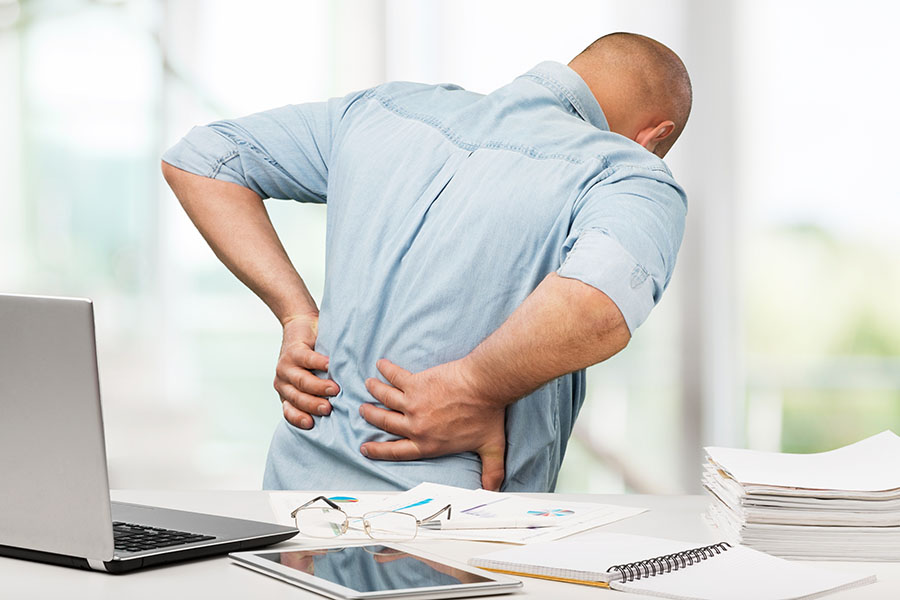Dehydration may seem like a minor problem, but it can actually be the case behind more significant health concerns. Dehydration can lead to back pain, muscle cramping, and other issues.
Wondering if your back pain might be from dehydration? Here’s everything you need to know about how and why dehydration can lead to back pain.
Can Dehydration Cause Back Pain?
The vertebrae in your spine are separated by gelatinous discs, which are mainly comprised of water. These discs lubricate your spine to provide flexibility in your movements and protect your spinal cord. Throughout the day, the spinal discs lose water that needs to be replaced. This process is called an intradiscal fluid exchange and is necessary to allow your body to move and function properly.
When you’re dehydrated, there isn’t enough water to properly replace the spinal disc. A dehydrated disc will start to partially collapse, putting pressure on the nerves surrounding your spine and creating back pain.
Dehydration can cause your spinal discs to swell. Too much pressure from swelling can result in a herniated disc.
Get Back Your Normal Life Again
As pain specialists, we can guarantee that we are more than qualified in alleviating your pain and treating your condition.
Back pain is far from the only negative health ramifications of dehydration. Your body needs water to properly maintain itself so dehydration affects your health in a wide variety of ways.
Signs of Dehydration
There are many symptoms of dehydration. Keep an eye out for the following conditions.
- Dry mouth
- Headache
- Fatigue
- Dry skin
- Blurry vision
- Decreased urination or dark urine
- Changes in blood pressure
- Extreme thirst
- Lightheadedness and dizziness
- Confusion
- Nausea
- Constipation
- Sunken eyes
- Ban breath
- Muscle cramps
Tips to Help You Stay Hydrated
The easiest way to make sure you are staying hydrated is to measure your water intake. Keep track of the amount of water you drink per day.
While it may depend on the climate and altitude you live in, generally experts agree you should drink between 4 to 6 cups of water per day. Those who live in a higher climate, more humid conditions, and hotter weather may need to drink more water to stay hydrated.
Your lifestyle can also impact how much water you need to stay hydrated. Your diet and the amount of physical exercise you do can also contribute to your hydration.
If you spend any time working out or doing labor-intensive activities, you’ll need to increase your water intake. Drink water before, during, and after exercising. Keep in mind that if you start to feel thirsty then you are already dehydrated.
How to Avoid Back Pain from Dehydration
Maintaining proper hydration throughout the day is the best way to prevent back pain from dehydrated discs. If you are experiencing excessive sweating, diarrhea, or vomiting then you are losing more water than average. You’ll need to consume water or other fluids and electrolytes.
Other factors, such as drinking caffeine or alcohol, can also increase dehydration. Stay aware of what your habits are to know how much fluids you’ll need to compensate.
What If Increasing Hydration Levels Doesn’t Relieve Symptoms?
To reduce your pain symptoms, monitor your pain levels and water consumption over several days. If you are staying hydrated but your back pain doesn’t decrease, your pain might not be a result of dehydration.
Alternatively, the damage to your discs might need to be repaired before you’ll start to feel relief. More serious damage, such as herniated discs, will need to be corrected. Talk to a medical professional to know what you need to do to start reducing your pain.
There are many different root causes of back pain. Consider going to a physician or a pain management specialist to find out what is causing your chronic back pain.
Ready to start managing your back pain? Arizona Pain and Spine Institute is Arizona’s #1 pain management provider. Call 480-986-7246 to book a consultation.

